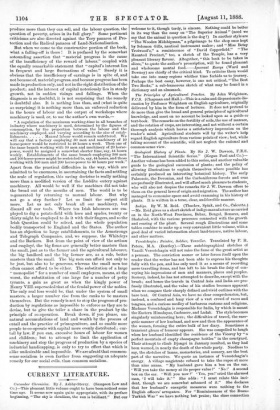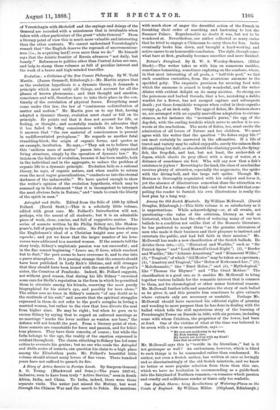Verestchagin : Painter, Soldier, Traveller. Translated by F. H. Peters,
M.A. (Bentley).—These autobiographical sketches of Vassili Verestchagin will not raise the fame of the great artist as a penman. The conviction sooner or later forces itself upon the reader that the writer has not been able to express his thoughts fully with the pen, and has only used it as a means of recording mere travelling items, and has left to his brush the duty of con- veying his impressions of men and manners, places and peoples. Scenery, indeed, he has not attempted to describe, except with the brush; and hence the travels in Central Asia and India are pro- fusely illustrated, and the value of his studies becomes apparent when we compare their sharply defined and vivid outlines with the bare text. Of Central Asia, we have no clear comprehension, but, instead, a confused and hazy view of a vast crowd of races and tongues, and a curious medley of barbarous customs and religions. Madame Verestchagin is responsible for India, by which is meant the Eastern Himalayas, Cashmere, and Ladak. The style becomes singularly uninteresting here; the difficulties of travel, the ener- getic manner of her husband, and now and then the appearance of the women, forming the entire bulk of her diary. Sometimes a transient gleam of humour appears. She was compelled to laugh when her husband identified the residence of the Viceroy by " a perfect mountain of empty champagne bottles " in the courtyard. Their attempt to climb Djongri in January resulted, as they had been warned, in nearly the death of the whole party. Needless to say, the sketches of lamas, monasteries, and scenery, are the best part of the narrative. We quote an instance of Verestchagin's energy. A village magistrate refused to take the rupee at more than nine annas. " My husband gave him a box on the ear. Will you take the money at its proper value ?" No !' A second box on the ear. ' Will you now ?" Yes, yes !' cried the alarmed man, 'I will take it.' " She adds : " I must relate this inci- dent, though we are somewhat ashamed of it." She declares that her husband's energetic measures were nothing to the , English officers' arrogance. For "Reminiscences of the Russo- Turkish War" we have nothing but praise; the close connection of Verestchagin with Skolieleff and the sayings and doings of the General are recorded with a minuteness that is invaluable when taken with other particulars of the great " white General." From a literary point of view this is much more valuable and interesting than the other contents. We cannot understand Verestchagin's remark that " the English deserve the reproach of unceremonious- ness [i.e., in acquiring land] even more than we do." He himself says that the Asiatic frontier of Russia advances " not daily, but hourly." References to politics other than Central Asian are rare, and help to stamp these volumes as full of peculiar interest and the work of a brave and high-minded traveller.



































 Previous page
Previous page